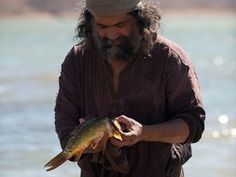Background Passages: Matthew 17:24-27; I Cor. 9:19-22; and Hebrews 4:15
For two days
they fished the Sea of Galilee.
The catch?
A little light in the net.
Good.
Not great.
Josiah hauled the barrel of fish to market.
Eli stayed in the middle of the lake,
casting the nets.
Selling the tilapia and carp in Capernaum
earned the two partners
a four-drachma coin.
Two day’s wages split
two ways.
That afternoon,
Josiah rowed his boat
alongside his brother’s skiff.
“How much?”
asked Eli.
“Barely enough,”
was the disappointed answer.
Josiah pulled the coin from the small bag
hidden in the pocket of his robe.
Handed it to his brother.
They fumbled the exchange and the
coin slipped from their fingers
into the water.
They watched helplessly as the sun glinted off
the silver coin as it twirled and tumbled
deeper into the sea and
out of sight.
Two days’ earnings lost.
The flash of light on silver caught the eye of a
carp swimming beneath the boat.
On instinct the fish struck and swallowed the object,
Cold and hard.
Lodged in the gullet.
And, the fish swam away.
Except for the fishermen who spent the rest of the day kicking themselves for their carelessness, this imagined episode was an insignificant event of life on the Sea of Galilee. Yet, God used this story to explain a critical truth about his son.
Jesus and his disciples arrived in Capernaum at a time when the “temple tax” was due. Once a voluntary gift to support God’s work at the temple in Jerusalem, the Romans twisted it into a mandatory tax to build its own pagan temples. Once a year, collectors set up a table on the outskirts of every Jewish town requiring everyone to pay the equivalent of a day’s wage to the Roman government. An unpopular tax, as you can imagine.
Jesus and his disciples had gained some notoriety among the people of Capernaum. This seaside village was his Galilean base of operation. Peter lived there. It is not unreasonable to assume the tax collector knew Peter well. As the disciple passed that day, the man, perhaps a natural critic and skeptic of Jesus and his work, challenged Peter.
“Does your teacher pay the temple tax?”
Without a glance at the tax man, Peter’s answer was terse and to the point. “Yes.”
Peter walked the streets toward his mother-in-law’s home where Jesus was staying, stewing over Roman arrogance and the abuse of the temple tax. The idea of paying a tax to build a pagan temple offended him. A few minutes later, Peter angrily pushed open the door, banging it against the wall.
Startled, Jesus looked up from the table where he sat eating a fig. With the insight of God’s spirit, Jesus took one look at the disciple’s face and answered the question before it was asked.
“What do you think, Simon? From whom do the kings of the earth collect duty and taxes? From their own children or from others?
Understanding the privileges of power, Peter looked at his feet and mumbled, “from others.”
“Then the children are exempt. But, so that we may not cause offense, go to the lake, throw out your line. Take the fish you catch. Open its mouth, you will find a four-drachma coin. Take it and give it to them for my tax and yours.”
What an odd and obscure passage of scripture! It’s no surprise, I guess, that Matthew is the only gospel writer to tell this unusual story. As a former tax collector, it was, after all, in his wheelhouse.
Though I read the passage in the past, I never gave it much thought. When I skimmed it this week, I stopped. The words of the Bible were not written by chance. So, why put these three verses in scripture for us to read?
Barclay tells us in his commentary that the story is a mini-parable. A story. He says Jesus would never use his power for something so mundane as to pay his obligations. Remember the temptations of Christ in the wilderness? Barclay says its Jesus’ way of telling Peter that his followers must pay our lawful debts, even when they find them distasteful. Jesus used this dramatic story to tell Peter, go fish. Earn what we need to earn to pay this tax.
I can buy the idea of a parable, but I’m not sure this commentary’s hammer is hitting its nail squarely.
The parable teaches us about Jesus. Draws our attention to him. Matthew’s gospel addressed the Jewish people who longed for the promised Messiah. It also speaks to all of us in need of the redemption offered by God through Christ. The story is about Jesus. King of the Jews. The atonement for sin. The ransom for the soul to which all the Old Testament and Jewish law pointed. As such, it is an important word.
However, when put in its broader context, maybe there is more we can learn. According to Matthew just a few verses earlier, Peter was among a trio of disciples to recently witness the transfiguration of Jesus on the mountaintop. They heard the affirmation of God declaring his love for his son and his pleasure at his work. When the experience was over, the disciples didn’t want to leave the mountaintop. They wanted to remain in awe-inspired, blissful worship. Jesus and his disciples, though, had more work to do so down in the valley.
With that remarkable experience still fresh on Peter’s mind, the tax collector confronted him in Capernaum. At that moment, I can see Peter bristling at the idea of paying a Roman tax when his master had just been affirmed by God in the presence of Moses and Elijah. There’s a sort of “Don’t you know who he is? or “Don’t you know who I am?” kind of arrogant vibe to the encounter. “This is God’s son you’re hassling, buddy! And I’m his right hand man! Back off!”
Peter really wanted to tell Jesus about the irritating encounter. Before he could get a word out, Jesus,with his keen insight into human nature, opened the conversation. It’s interesting that Jesus used Peter’s old name in this passage. He called him “Simon.” Jesus reverted to Peter’s birth name on those occasions when Peter was not acting like “the rock” he needed him to be. I suspect when Jesus addressed the disciple as Simon it was the same as my Mom calling me, “Kirk Allan.” A “what have I done this time?” moment.
Peter probably answered Jesus’ question tentatively, with uncertainty in his voice, “the others…”, but he answered correctly. The implication from Jesus clear. “On one level, Peter, you’re not wrong. You and I both know I’m the son of God. You heard as much on the mountain. As the son of God I am under no obligation of any kind to man’s law and rule. But, that’s not the point, is it?”
Then, Jesus uttered a phrase that changes Peter’s perspective from a position of holy supremacy to a posture of humble service.
“So that we may not cause offense…”
Those who know tell me that the Greek word used for “offense” in this passage means “to cause someone to stumble.” It suggests that even though Jesus, by nature of who he is, had no obligation to pay this tax, he would pay it so his refusal would not be an obstacle placed before the Jewish people. He didn’t want to create an issue that would distract from the message he preached.
Paul reflected a similar attitude with the Corinthian church.
“For, though I am free from all men, I have made myself a servant to all, that I might win more…I have become all things to all men that I might by all means save some. (I Cor. 9:19-22)
Jesus didn’t come to make a political or cultural point. He came to redeem a world that had lost its way. Throwing up obstacles, creating distractions, would not get it done.
Jesus constantly made conscious decisions throughout his ministry to set aside his position as God’s son consistent with his pattern of grace and sensitivity to the struggles of others. The writer of Hebrews reminds us…
“For we do not have a high priest who is unable to empathize with our weaknesses, but we have one who has been tempted in every way, just as we are…yet he did not sin.” (Hebrews 4:15)
As an act of love, Jesus…
set aside his place as the son of God…
never compromised his message or ministry…
complied with the mundane…
replaced condemnation with forgiveness…
all in an effort to avoid setting obstacles in front of those whom he wanted to place their faith in him.
I wonder if that’s not the best lesson found in this fish tale? As children of God, we see many things in this world that we know are not right. Actions counter to God’s law and his will. It has become so easy to condemn without grace. To set barriers between those who offend our political and cultural convictions and the salvation offered by Jesus’ death and resurrection.
The story causes me to think. What barriers have I erected? What have I said or done in my own arrogance that would stand in the way of my witness to others about Christ?
“So that we might not cause offense…”
It’s a fish tale worth considering.

